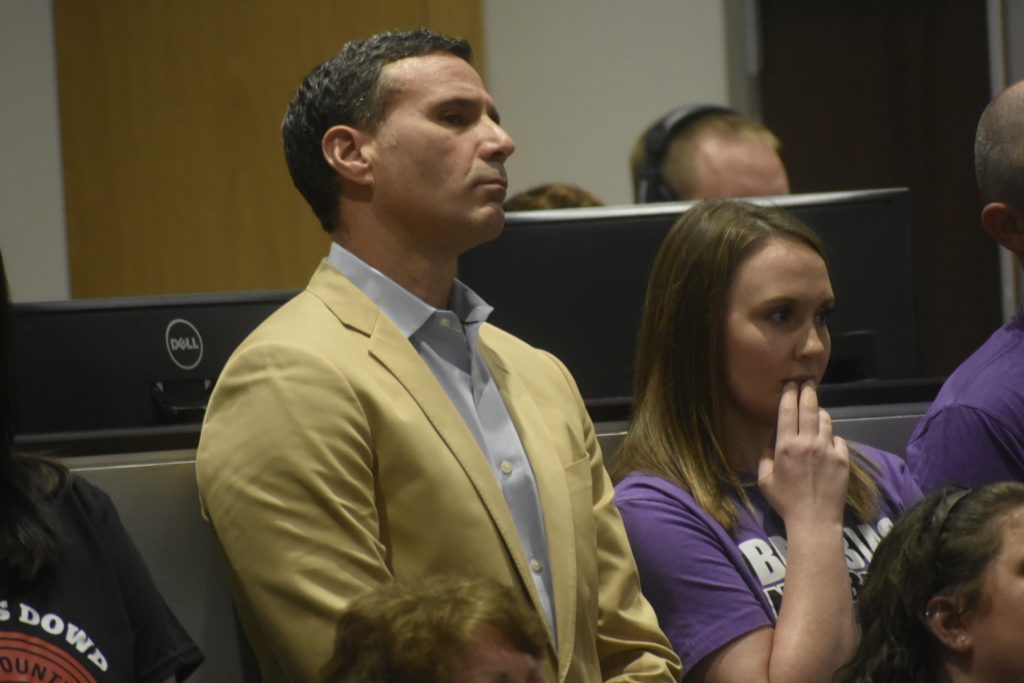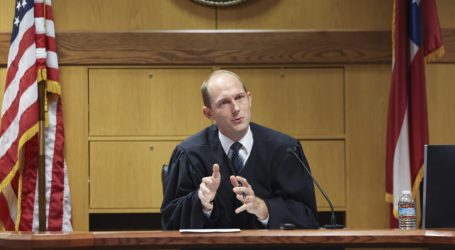Cobb School Board votes to fire teacher who read book about gender identity

Katie Rinderle and attorney Craig Goodmark await the Cobb County School Board’s decision on Rinderle’s termination. Ross Williams/Georgia Recorder
The Cobb County School District rejected the advice of a disciplinary tribunal Thursday night and terminated Katie Rinderle, the elementary school teacher who came under fire from some parents after reading a picture book touching on topics of gender fluidity.
Speaking after the 4-3 party line vote, Craig Goodmark, an attorney representing Rinderle said the 10-year teacher was upset by the decision, but that her certification is still intact and she plans to teach again. Goodmark also said she is keeping her legal options open.
“There’s a process that’s in place for teacher terminations, they have a direct appeal to the state board of education, but Katie has rights, she has potential claims,” he said. “We’re going to look at every legal avenue before we make a decision as to what we’ll do next.”
At issue was “My Shadow is Purple,” a picture book by Australian author Scott Stuart, which features characters who have shadows that are blue or pink corresponding with their gender, except for the protagonist, whose shadow is purple and has both masculine and feminine traits.
After two days of testimony, a tribunal of three educators found that Rinderle made errors, including not speaking with administrators before reading the book to her class of 10- and 11-year-olds, but recommended against firing her.
District rules forbade speakers at two Thursday meetings from directly discussing Rinderle’s case, but most found ways around it.
LGBTQ+ rights
Some parents spoke up in support of LGBTQ+ children.
Beverly Wynne said four of her six children went to the same school where Rinderle taught, including one now adult child who she said experienced homophobic abuse from another student.
“They exist in every classroom, every grade,” she said. “They are not people to be shoved in the shadows. They are children. Children who, alongside any child who feels they don’t belong, deserve to be protected from bullying and know that they are cared for and valued by their teacher.”
“I am very grateful to those teachers who I believe understood that my child was different even before I did,” she added. “I thank God for those teachers. I would ask you to allow teachers to do what they do best, provide an environment of caring and support that enriches the learning process and brings out the best in every child in the classroom.”
Erin Elwell, president of the Marietta chapter of PFLAG, a group for LGBTQ+ people and their loved ones, cited statistics she said demonstrate that LGBTQ+ children are more likely to experience bullying and homelessness than other children, and that programs emphasizing inclusion reduce such disparities.
“This is apolitical, and the school district needs to catch up and meet the educational needs of this population,” said Elwell, who called herself a Cobb parent and alumna. “And what if a parent complains? It’s simple. It’s not their business. You don’t make a left-handed kid draw with their right hand because it might confuse a right-handed kid. Parents do not get to advocate against students. Period.”
The opposition
Those opposed to keeping Rinderle on board also found ways to make their point. During her testimony, Rinderle said the book was not exclusively about gender, and Cobb mom of two Abigail Darnell appears to have taken umbrage to that, speaking to school board members about the topic of book selection.
Darnell, a Republican activist, said she chooses books to read to her kids in accordance with the values she wants to instill in them.
“Parents aren’t stupid,” she said. “If I’m intentional about what I’m reading to my child, I can only assume that a professional educator is also being intentional about the concepts in the books that they are providing and reading to the children in the classroom. And I’m very concerned about the prospect of radical ideas being introduced to young children without parental consent or notification. Teachers shouldn’t be allowed to bring leftist political activism into the classroom and get away with it.”
Hugh Norris, who described himself as a 25-year Cobb resident, took a wider view.
“We all know that western civilization is under attack from all angles,” he said. “The evilness is apparent everywhere. About all of our institutions are now captured. Now they’re coming for the children, physically, to surgically devastate their bodies, and mentally, to confuse their minds. I pray the board has the courage and clear thinking to follow laws enacted by the state of Georgia.”
Last year, the Georgia Legislature passed a series of education-focused bills, codifying a parent’s rights to approve classroom or school library materials and forbidding the teaching of some divisive concepts.
What is divisive?
Rinderle’s side argued that the law was too vague for a teacher to reasonably know what concepts a parent in his or her classroom might find objectionable.
“Teachers across the county have been pulling their classroom libraries, they are pulling supplemental materials,” said Jeff Hubbard, president of the Cobb County Association of Educators. “I mean, I taught 8th grade Georgia state (history), they’re pulling slavery, Jim Crow, antebellum era, the Leo Frank lynching, four miles from here. What’s now going to be controversial and what’s not? It could be any topic because the state has still failed to state what is divisive and what is controversial.”
The state Senate could be working on that, but not in the way Rinderle’s supporters might hope.
The Senate Committee on Education and Youth and the Senate Committee on Higher Education are scheduled to meet Wednesday, and the only item on the agenda is Senate Bill 88, which Cordele Republican Sen. Carden Summers calls the “Parents and Children Protection Act of 2023,” but opponents have dubbed Georgia’s version of Florida’s so-called “Don’t say Gay” bill.
The bill, which was aimed at limiting authority figures’ ability to answer childrens’ questions about gender identity or sexual orientation, was tabled in the spring amid concerns it could invite legal challenges, but could be revised and revived for the coming legislative session set to begin in January.
SUPPORT NEWS YOU TRUST.
The post Cobb School Board votes to fire teacher who read book about gender identity appeared first on Georgia Recorder.





